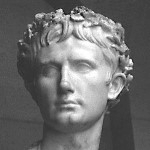

»Live for the moment, before it's gone. Don't put your faith, in what's gonna come.« Who did say it? asks Italian blues singer and guitarist Mike Sponza. Was it John Lee Hooker? No, not at all, it was Roman poet Quintus Horatius Flaccus (Horace), the leading poet during the time of Roman emperor Augustus. Fascinated by ancient Rome himself, Walkin' Tom Keller was illuminated by Mike Sponza about linking ancient lyric with contemporary music.
Tom Keller: Looking back, how did an Italian come to play blues music?




Mike Sponza: Well, like many musicians of my generation, I’ve been exposed a lot to the music of the sixties when I was a boy. So, guitars, bands, rock’n’roll and all the related stuff. Mainly Beatles and Chuck Berry. I’ve discovered the blues around 13, and I’ve bought my first 33’s of Muddy Waters, John Mayall, John Lee Hooker… I was very attracted by this sound from the beginning: I’ve spent the whole summer of 1983 playing air guitar on “Can’t buy me love”… then I’ve bought a real guitar!
Which artists are your particular influences then?
I’ve always listened to many different music genres, and I think this comes out in what I do, but when I need to reset my compass, I listen to some classic Muddy Waters and B.B King recordings. They are the roots of my music style.
Please tell us a little bit about your musical career!
I’ve formed my first band in 1987. The first professional group started working in 1991: I toured in my area for a while, and then I began performing in near countries like Slovenia, Croatia, Austria… Through the years this circuit expanded all over Europe.
I’ve released 7 solo albums, and some others with guests or recording as a guest. I’m the founder of the “European Blues Convention” a large blues project which gathered 35 musicians from all over Europe, and I also perform with a symphonic orchestra: I like big sounds!
Your latest record, »Ergo Sum« (Latin for »Therefore I am«), is a concept album merging the words of the ancient Latin poets Catullus, Horatius, Martialis and Juvenalis with blues and soul music. How did you get that idea?
One evening I was reading some Catullus’ poems, and all of a sudden I had stories of jealousy, evil women, love-hate…ain’t this blues? I’ve searched for other poets and a lot of brilliant lyrics came out, also about politics, the fight for power, friendship…
Are these writers still part of the Italian school curriculum? Or how did you get acquainted with them?
Yes, Latin literature is a regular subject at Classic Lyceum (but also from Grade 6 classes), together with Greek literature. I’ve spent so much time for years on these writers, and I’ve never stopped reading and loving them: finally I’ve found a way to compensate all those hours on books…
What were your criteria to select the poems, and what was your musical approach?
I’ve worked on the selection with my ex high-school teacher: we decided to focus on some popular poems, not the “hidden” ones, so that they can be recognized easily by the listener - you know, “Carpe diem”, “Odi et amo”…
Latin poems have a rhythmic metric: you can’t just read them… they have accents. I must say that in some case this original “rhythm” was the starting point. Also some particular words and concepts have played a key role in the selection.
What is your favourite piece then?
The first poem I’ve started to work on, it’s been written by Catullus: it’s known as “Miser Catulle” - and it became the song “Poor Boy”. As soon as I translated it in rough English, it was clear that it was written as a 12 bars blues 2000 years ago… incredible. It’s a strong shuffle, with horns, all sung in double voice by Ian Siegal and me. Quite powerful…
»Ergo Sum« has been recorded at London's Abbey Road Studios with blues vocalist Dana Gillespie and blues guitarist/vocalist Ian Siegal. Please tell us a little bit about that experience!
Well, passing the door of Abbey Road Studios as a recording artist, it’s like entering Saint Peter's Cathedral!
From the very first minute, it’s clear that everybody in the studios is working to produce great music and helping you to get the best out of you. You feel comfortable a second after the initial “shock” of being in Abbey Road, surrounded by all the photos of musical legends who recorded there. The album has been entirely produced by Rob Cass, who gave my songs the greatest sound: I hope we can work together again soon!
Is there any chance to see you perform these songs?
Yes, I will perform in Germany in December 2016 …… and also in May 2017. A good festival is also confirmed for July ’17. You can find all the details on my website.
Photo Credits:
(1)-(2) Mike Sponza,
(3) Gaius Valerius Catullus,
(4) Quintus Horatius Flaccus,
(5) Marcus Valerius Martialis,
(6) Decimus Iunius Iuvenalis
(unknown/website).